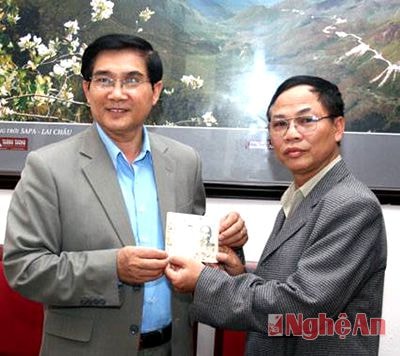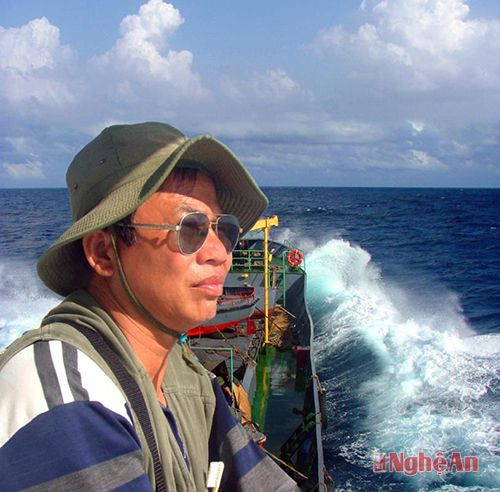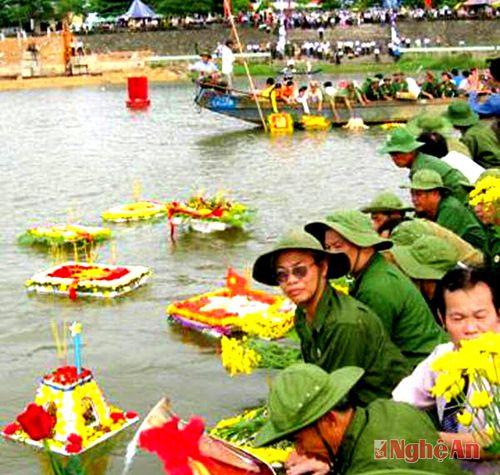Journalist Le Ba Duong: Traveler on the train platform
(Baonghean) - I don't know how many articles have been written about him - the brave, upright, intelligent and loving son of Nghe An. People use many "expensive" phrases to talk about this journalist and photographer: The man who releases flowers on the Thach Han River, The man who pays off past debts, The man who lives for his comrades, The man who makes a blood oath, The poet of "one poem", Famous veteran... But each of those names only tells "a corner" of Le Ba Duong.
I also struggled to read him, to write a Le Ba Duong that I knew, but then, it was also difficult. And I chose to draw him with the simplest brush strokes, as I saw, on the train platform - a sunny afternoon, before the train took him from Vinh to Nha Trang. At that time, in front of me was a brother, a friend, a colleague slowly, calmly telling me stories about his life. Next to him was a bundle of plants, soft green leaves reaching out from an old newspaper. He told me: "That's the lang leaf from my hometown, I want to plant it in Khanh Hoa. My family only uses "goods" from Nghe An."
 |
| Journalist Le Ba Duong (right) presents a photo of Uncle Ho with his bloodwritten signature to the Vietnam Museum of History. |
Just like that, a simple sentence, I saw how close this famous veteran was. After many years away from home, going through many ups and downs, facing death hundreds of times while going through the war, doing so many things that people call “heroic”, so that at the train station this afternoon, he was just a small son of Nghe An, still missing his homeland.
“Missing the land, because all my life I have the feeling of someone who is far away. Longing to return, and then the time comes to leave, to say goodbye. In my life, after all, there are so many goodbyes.” He said so thoughtfully, his eyes flashing as if he had returned to more than 50 years ago. At that time, the boy Le Ba Duong was taken by his father - People's Artist Le Ba Tung (he was one of the first artists in Nghe An to be awarded this title) to live with him in Hanoi when he was very young (People's Artist Le Ba Tung at that time worked at the Department of Stage Arts). He missed his mother, missed his hometown, but in Le Ba Duong's imagination, the image of his mother was not clear, he only knew that his mother looked exactly like his aunt (and his aunt at that time also lived in Hanoi), he did not even remember his mother's name. However, that 7-year-old boy decided to sneak on a train alone, to find his hometown in Thai Hoa, Nghe An.
The train only went to Thanh Hoa station, Le Ba Duong got off and took a truck back to Thai Hoa. The driver asked where he was going, said he was going to Phu Quy market, asked his mother's name, he couldn't remember, asked where his house was, he didn't know. He only knew that his mother sold goods at the market. That kind driver not only treated the boy to a meal along the way, but also took him all the way to Phu Quy market so he could find his mother. There, a woman who looked a bit like her aunt, she must be his mother, Le Ba Duong rushed over: "Mom!". At that moment, the woman turned around in surprise: "Who are you, why are you calling me mom?" "It's me, mom, it's Tu Duong. I ran away from my father and took a bus back from Hanoi". That's right, it's Tu Duong, why are you so brave? The mother hugged her son in her arms, unable to believe that her son, who had been away for years, was so small, but dared to do such a terrible thing. Outside Hanoi, the news of his missing son was published in the newspaper by Mr. Le Ba Tung. Later, when he was informed, he learned that his son had escaped back home...
 |
| Journalist Le Ba Duong on the ship to Truong Sa island. |
Decisiveness and recklessness may have affirmed a part of Le Ba Duong's personality since childhood. Few people know that a "hidden corner" in Le Ba Duong's soul is the obsession with poverty. But, perhaps that also helped him to strengthen his will, to sympathize, to share with people, with life, to love and appreciate. Le Ba Duong said that at the age of 13, he was already proficient in clearing fields, building huts, and sleeping alone in the forest. His day was always self-contained: early in the morning he went to school, at noon he went to the mountain to chop firewood, in the afternoon he went to dig for worms and crickets, late at night he went to set up eel traps or set up night nets so his sister could sell them early at the market. Then, when the season came, he took on jobs raising ducks and peeling peanuts. Sometimes he would walk into the forest (20 kilometers from home) to cut bamboo, and at night he forced himself to sleep in the middle of a stall on a tree trunk. When he had enough bamboo, he would make a raft and go home. In his heart, he thought: I will try my best to help my mother, help my sister, help my younger brother to have less hardship... With his father far away, Le Ba Duong was almost the pillar of the whole family. After joining the army, Le Ba Duong also kept the habit of being thrifty and saving. He collected every piece of old clothes, cut them up, sewed them, and sent them home to his younger brother.
At the age of 15, while still in the 7th grade, Le Ba Duong volunteered to join the army. He said he volunteered, but he lied about his age. It was 1968 - the war was fierce. He said he had to go to the front, partly because of the fiery atmosphere of those days, and partly because of the heroism and curiosity of youth. Only a short time after joining the army, when he had just turned 15, Le Ba Duong became a brave soldier who defeated the Americans in the battle at the Dong Ha front (Quang Tri). In another decisive battle, Le Ba Duong once wrote in blood dripping from his wound on a picture of Uncle Ho that he carried with him before entering the battle: “Uncle Ho, starting from today, June 20, my comrades and I will open fire and start destroying the enemy to defend the post until the end. Quan killed 7 of them, Hoe and Duong more than a dozen. Remembering your teachings, as long as there are any invaders left in our country, we will continue to fight and wipe them out. Uncle, our responsibility and determination is to defend the post”. Later, he donated the picture of Uncle Ho with that bloody letter to the Vietnam Military History Museum.
 |
| Journalist Le Ba Duong and his teammates release flowers on the Thach Han River. |
The story of his bravery in combat, his being a brave soldier, being published in Tien Phong, Quan Doi Nhan Dan, Nhan Dan newspapers in the 70s... has been written and told by many people. But Le Ba Duong told me, when I wanted to ask more about his exploits: “Certainly, if given a choice, none of us would choose war. Just like the Heroic Vietnamese Mothers, no one wants their children to die in battle to be awarded the title of hero. But the problem here is that war chooses us, not that we choose war. We have to accept that choice”. In 1972, while passing by a school in Hai Lang, Quang Tri, Le Ba Duong suddenly remembered a childhood dream: holding chalk and standing on the podium. As if unconsciously, he absentmindedly walked up to the podium, held chalk and wrote: Number of students: 127, present: 87, absent: 40, Reason: Died on the way to school. He said: It hurts so much!
And coming out of the war, Le Ba Duong understood many things about death, about the meaning of life, about love, and loyalty. He said, he was able to live because his comrades had shared life with him, and he had to live with all gratitude. It was his hands that had held each piece of bloody body, it was his hands that had buried the flesh and bones of his comrades in the ground, and so, when the war was over and he returned, just a few days later he put on his backpack and headed to Quang Tri - the former battlefield of him and many comrades. He went to the cemeteries, lying with his comrades, as if to give them a little warmth, and also to warm his heart. The first flower raft he released into the Thach Han River was just wild flowers, which later became a custom of the people of Quang Tri and of many martyrs' relatives on every occasion of Tet or July 27. A gesture that became a festival of gratitude. He is also the organizer of pilgrimages, "sleeping in the forest with comrades", "bringing the country and homeland to comrades" with the thought: Many soldiers have stayed in the land of fire, their remains cannot be found, they cannot be brought back home. If we cannot bring our comrades back home, then we bring our homeland to our comrades, with each jar of river water, each handful of homeland soil...
Also from here, the verses engraved on stone stele, erected on the side of Thach Han River, were born: "Boat up Thach Han, oh... row gently/ At the bottom of the river, my friend still lies/ At the age of twenty, he became waves/ Lapping peacefully on the shore, forever and ever".
Claiming to be a “camp journalist and tent poet”, Le Ba Duong’s poems live forever in the hearts of his readers and comrades. Because his poems never leave the most genuine emotions about his comrades, with memories that he could never forget throughout his life. It is the story of a father and son who met on the march, asking each other for a long time before realizing “You are my child”, and then after the moment of parting, both never returned. It is also his own story, hiding from his friend that he was also wounded in order to give him a piece of bandage when his chest was torn open by a bomb… Then he received the last words, that he would die anyway, Duong should keep it and bandage him…
And not only poetry, Le Ba Duong is also a photographer with a photo exhibition that was displayed after his trip to Truong Sa. His photography is always associated with soldiers, with noble and sacred sacrifices...
Born in Nghe An (father from Vinh, mother from Dien Chau), living in Nha Trang, but Le Ba Duong is an honorary citizen of Quang Tri because of what he has lived and done for this land.
Saying goodbye to Le Ba Duong with a wave and a very light smile, he carried his luggage into the train cars. His life, was still a pilgrimage. He was always a traveler on the train platforms. Going as if in debt. And returning as well, as someone in debt. Because the heart of that brave and reckless boy from long ago, was always full of love...
Thuy Vinh

